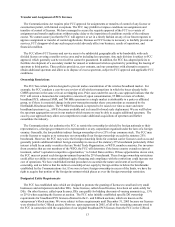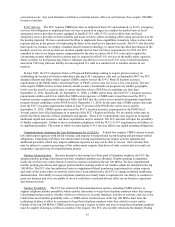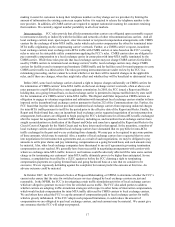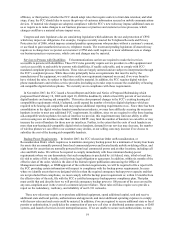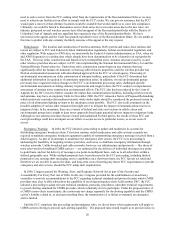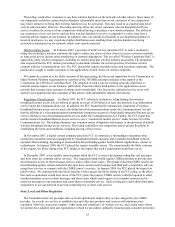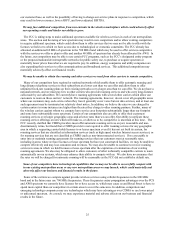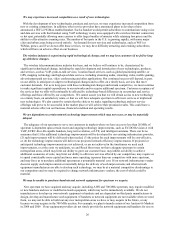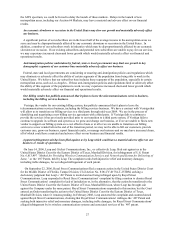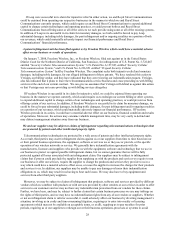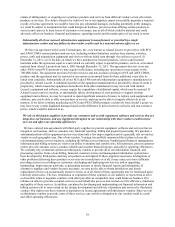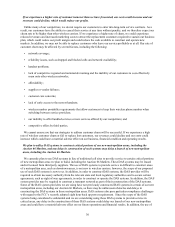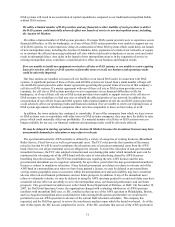Metro PCS 2007 Annual Report Download - page 32
Download and view the complete annual report
Please find page 32 of the 2007 Metro PCS annual report below. You can navigate through the pages in the report by either clicking on the pages listed below, or by using the keyword search tool below to find specific information within the annual report.
21
our customers of whether we are electing to provide emergency alerts and may require us to change certain of our
business processes and activities. If we elect to provide such emergency alerts, we may incur costs and expenses,
which costs and expenses may be material, and our customer may be required to purchase new handsets. If we
decide not to participate in providing emergency alerts, our customers may decide to terminate their service with us
and the impact of such customer terminations may be material.
Roaming. The FCC historically has required that CMRS providers permit customers of other carriers to roam
“manually” on their networks, for example, by supplying a credit card number, provided that the roaming
customer’ s handset is technically capable of accessing the roamed-on network. In August 2007, the FCC released a
Report and Order and Further Notice of Proposed Rulemaking clarifying that automatic roaming also is a common
carrier obligation for CMRS carriers. This ruling requires CMRS carriers to provide automatic roaming services to
other CMRS carriers upon reasonable request and on a just, reasonable, and non-discriminatory basis pursuant to
Sections 201 and 202 of the Communications Act. The FCC found that this automatic roaming obligation extends to
services such as ours that are real-time, two-way switched voice or data services that are interconnected with the
public switched network and utilize an in-network switching facility that enables the provider to reuse frequencies
and accomplish seamless hand-offs of subscriber calls. The FCC, however, did not extend the automatic roaming
right to areas where the roamer’ s home carrier holds licenses or leases spectrum. This in-market limitation may
preclude our customers from receiving automatic roaming in large portions of the United States where we recently
acquired licenses but have not yet built networks or offer services, such as the Auction 66 Markets. Automatic
roaming rights are important to us because we provide service in a limited number of metropolitan areas in the
United States and must rely on other carriers in order to offer roaming services outside our existing metropolitan
areas. The Report and Order’ s limitation of automatic roaming rights to areas in which we do not hold or lease
spectrum may substantially limit our ability to benefit from the requirement that other CMRS carriers offer us
automatic roaming and could limit our ability to renew or extend our existing roaming agreements. As a result we
could have difficulty attracting and retaining certain groups of customers which could have a material adverse effect
on our business. We and other carriers have filed petitions for reconsideration of this limitation, but we are unable at
this time to predict with any certainty the likely outcome of these reconsideration requests.
The FCC did not extend the automatic roaming obligation to services that are classified as information services
(such as high speed Internet services) or to services that are not CMRS. In the Further Notice of Proposed
Rulemaking, the FCC sought comment on whether the roaming obligation should be extended to non-interconnected
services or features, including services that are classified as information services, or to services that are not CMRS.
We and other carriers filed comments supporting the extension of the automatic roaming obligation to non-CMRS
services where technically feasible, but other commenters, including certain nationwide wireless service providers,
opposed this extension. We cannot predict the likely outcome of the Further Notice of Proposed Rulemaking or the
likely timing of an FCC ruling. If the FCC does not adopt an automatic roaming requirement for non-interconnected
services or features, such as information services, high speed broadband services, and broadband Internet access
services, we could have difficulty attracting and retaining certain groups of customers which could have a material
adverse impact on our business.
Copyright Protection. In November 2006, the Copyright Office of the Library of Congress, or the Copyright
Office, released the final rules in its triennial review of the exemptions to the prohibition on circumvention of
copyright protection systems for access control technologies, or Triennial Review, contained in the Digital
Millennium Copyright Act, or DMCA. In 1998, Congress enacted the DMCA, which among other things amended
the United States Copyright Act to add a section prohibiting the circumvention of technological measures employed
to protect a copyrighted work, or access control. In addition, the Copyright Office has the authority to exempt
certain activities which otherwise might be prohibited by that section for a period of three years when users are (or
in the next three years are likely to be) adversely affected by the prohibition in their ability to make non-infringing
uses of a class of copyrighted work. Many carriers, including us, routinely place software locks on their wireless
handsets which prevent a customer from using a wireless handset sold by one carrier on another carrier’ s system. In
its Triennial Review, the Copyright Office determined that these software locks on wireless handsets are access
controls which adversely affect the ability of consumers to make non-infringing use of the software on their wireless
handsets. As a result, the Copyright Office found that a person could circumvent such software locks and other
firmware that enable wireless handsets to connect to a wireless telephone network when such circumvention is
accomplished for the sole purpose of lawfully connecting the wireless handset to another wireless telephone
network. This exemption is effective from November 27, 2006 through October 27, 2009 unless extended by the
Copyright Office.




